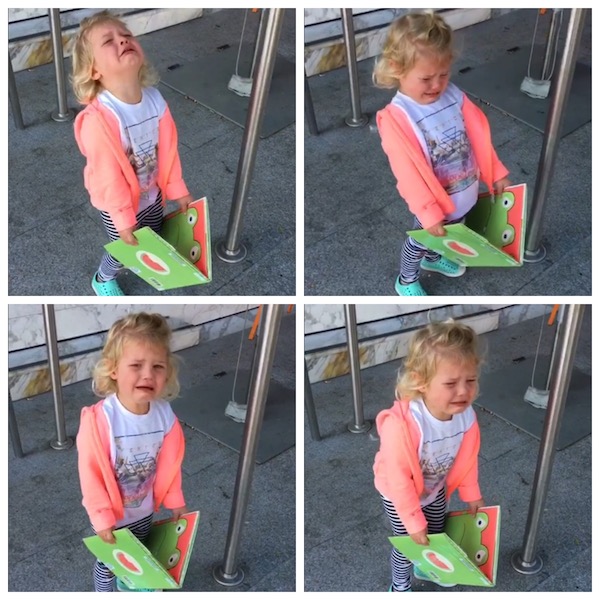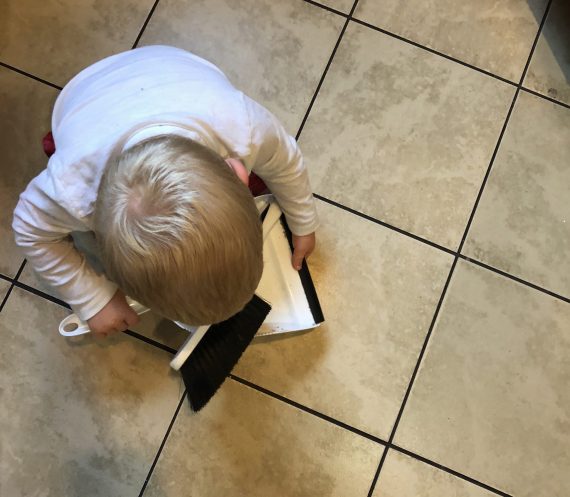Toddler life is a roller coaster of emotions to be sure. Of course, you have your classic ‘terrible two’ moments. Then you get the sweetest, most adorably uninhibited slivers of pure love and joy that make you regret your fantasy of running away to a deserted island.
They certainly test your patience, but the truth is, toddlers are going through a major physical and mental development period. And for the first time in their lives, they are kind of aware of it. Separation anxiety peaks, independence flourishes, and big emotions fly a little beyond their control. Call it a preview to their teen years and take the time now while they are still (somewhat) under your control to sharpen your skills in empathy and consistency. These are the two themes that popped up over and over when we spoke to ten different toddler moms about how they weather the stormiest of tantrums.
1. Help verbalize the situation
“I always try to narrate what’s going on or what happened. I tell [my son] how tough ‘blank’ can be, relate to him. I let him have his feelings for a little while and then try to move on with a compromise, solution or good old distraction.” – Mandy
2. Walk away
“I tend to walk into another room and try to tune [my daughter] out. She doesn’t have physical tantrums where she thrashes around so I know she’ll be safe. After a few minutes, I’ll go in and hold her sweetly and say ‘I know. I know. Those are big feelings. I know. You’ll be ok.'” – Andrea
3. Breathe together
“I hold both of [my son’s] hands and we look into each others eyes. We do a bit of a breathing exercise (deep breath in and exhale) I try to tell him that I empathize with his frustration fully and try to find a solution for us. A lot of talking, but never time out.” – Iris
4. Redirect and stay nearby
“I try to redirect [my daughter’s] attention to something different. If that doesn’t work, I just let her cry. I used to leave the room and she would stop crying quickly but now I stay close by while she’s having a tantrum to let her know I support her feelings.” – Anna
5. Keep kids informed about their day
“I have noticed that it’s all about preempting a tantrum by giving [my daughter] a warning when things are about to happen – five mins until we turn off the TV, leave the park etc. If she has a heads up first, it eases those big feelings.” – Sarah
6. Positive reinforcement helps encourage good behavior
“We tend to just let [my son] cry, have a few minutes of tantrum – maybe five and then try to distract him with something. He has also really responded to positive reinforcement. We use pompoms in a jar when he does something good and when the jar is full he gets a toy.” – Steph
7. Focus on your child
“I adjust my response depending on what causes the tantrum in the first place. A lot of [my son’s] tantrums seem like they’re about attention-seeking so what works for me is getting down at his level and having a ‘time in’ where I just give him a hug and all of my attention, even just for a minute.” – Jenny
8. Keep everyone in the planning loop
“Tantrums tend to happen more when I’m rushed and not explaining to [my daughter] what’s going on, so making sure she is aware of the plan without overwhelming her with details helps a lot in preventing a meltdown.” – Mara
9. Don’t fall into an over-explaining trap
“If it’s a tantrum about wanting something – say a toy, I keep my response brief “we’re here to buy dish soap, not toys” for example, I try not to over explain and just move on. I also try to avoid situations where I know [my son] will be overcome with desire – like the toy aisle at Target. I’ve been consistent enough that he knows tantrums don’t really work. If he’s overtired or hungry, I satisfy those needs as soon as I can.” – Chelsea
10. Encourage them to use words
“I’m all about getting right down on the floor, or to [my daughter’s] level and asking her to label her feelings. I offer some suggestions – Are you feeling frustrated? Tired? Angry? Hungry? Her crying will usually ease up enough to give me an answer and then we address a solution based on what she says. Tired and hungry are simple. Frustrated or angry, sad, etc. are sometimes trickier, but labeling her feelings each time has brought her to a point where when she starts to feel overwhelmed, she’ll say to me ‘I’m feeling frustrated because…’ which makes things a lot more clear for me in handling her feelings swiftly.” – Sasha
Tantrums are never easy to weather, especially those of the grocery store/restaurant/airplane variety, but it’s always good to take a few deep breaths and remind yourself that toddlerhood can be a trying time for both you and your little one. Raising your voice, energy or frustration level will likely build the tantrum tension, so staying calm, cool, and collected are the major keys when emotions run hot.
Featured image photo credit: Ben Starkman @bgsimages










